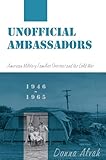Unofficial Ambassadors : American Military Families Overseas and the Cold War, 1946-1965 / Donna Alvah.
Material type: TextPublisher: New York, NY : New York University Press, [2007]Copyright date: ©2007Description: 1 online resourceContent type:
TextPublisher: New York, NY : New York University Press, [2007]Copyright date: ©2007Description: 1 online resourceContent type: - 9780814705315
- Americans -- Foreign countries -- History -- 20th century
- Cold War
- Families of military personnel -- United States
- Military spouses -- United States
- HISTORY / Military / United States
- Alvah
- Cold
- US
- about
- abroad
- analyzing
- broadens
- culture
- family
- gender
- history
- ideas
- military
- presence
- race
- scope
- shaped
- 355.129 23
- UB403 .A469 2007
- online - DeGruyter
| Item type | Current library | Call number | URL | Status | Notes | Barcode | |
|---|---|---|---|---|---|---|---|
 eBook
eBook
|
Biblioteca "Angelicum" Pont. Univ. S.Tommaso d'Aquino Nuvola online | online - DeGruyter (Browse shelf(Opens below)) | Online access | Not for loan (Accesso limitato) | Accesso per gli utenti autorizzati / Access for authorized users | (dgr)9780814705315 |
Frontmatter -- Contents -- Acknowledgments -- Introduction -- 1. Going Overseas -- 2. Unofficial Ambassadors -- 3. A U.S. Lady’s World -- 4. “Shoulder to Shoulder” with West Germans -- 5. “Dear Little Okinawa” -- 6. Young Ambassadors -- Conclusion -- Notes -- Bibliography -- Index -- About the Author
restricted access online access with authorization star
http://purl.org/coar/access_right/c_16ec
As thousands of wives and children joined American servicemen stationed at overseas bases in the years following World War II, the military family represented a friendlier, more humane side of the United States' campaign for dominance in the Cold War. Wives in particular were encouraged to use their feminine influence to forge ties with residents of occupied and host nations. In this untold story of Cold War diplomacy, Donna Alvah describes how these “unofficial ambassadors” spread the United States’ perception of itself and its image of world order in the communities where husbands and fathers were stationed, cultivating relationships with both local people and other military families in private homes, churches, schools, women's clubs, shops, and other places.Unofficial Ambassadors reminds us that, in addition to soldiers and world leaders, ordinary people make vital contributions to a nation's military engagements. Alvah broadens the scope of the history of the Cold War by analyzing how ideas about gender, family, race, and culture shaped the U.S. military presence abroad.
Mode of access: Internet via World Wide Web.
In English.
Description based on online resource; title from PDF title page (publisher's Web site, viewed 06. Mrz 2024)


